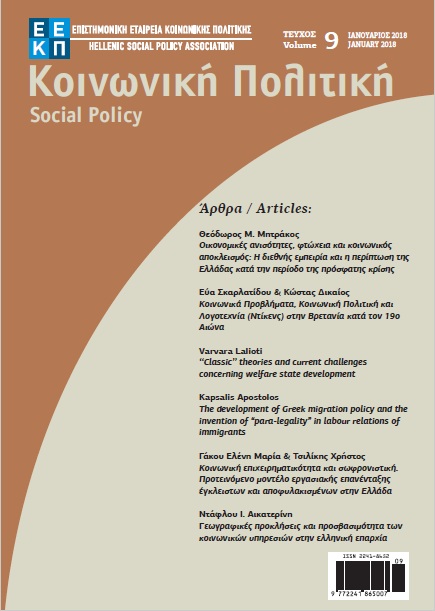Economic inequalities, poverty and social exclusion The international experience and the case of Greece during the recent crisis

Abstract
The issues of inequality, poverty and social exclusion have become particularly relevant during the crisis, and the available empirical findings can inform the ongoing political and social debate. In this context, the present paper summarises the main findings on economic inequalities based on international experience, before going on to discuss the results of available survey regarding the levels and changes of social indicators such as income inequality, poverty, social exclusion and other welfare indicators in Greece during the recent crisis. As shown by the analysis, a decline in the share of labour income in total income can be observed internationally, while income inequality globally remains at historically high levels. In the case of Greece, inequality and poverty indicators deteriorated considerably in the early years of the recent crisis, especially in comparison with households’ pre-crisis living standards. These points to an urgent need to redefine the key parameters of social policy in the light of the recent economic crisis and the current economic conjuncture.
Article Details
- How to Cite
-
Mitrakos, T. (2018). Economic inequalities, poverty and social exclusion The international experience and the case of Greece during the recent crisis. Social Policy, 9, 7–24. https://doi.org/10.12681/sp.15983
- Issue
- Vol. 9 (2018)
- Section
- Articles

This work is licensed under a Creative Commons Attribution 4.0 International License.
Authors who publish with this journal agree to the following terms:
Authors retain copyright and grant the journal right of first publication with the work simultaneously licensed under a Creative Commons Attribution Non-Commercial License that allows others to share the work with an acknowledgement of the work's authorship and initial publication in this journal.
Authors are able to enter into separate, additional contractual arrangements for the non-exclusive distribution of the journal's published version of the work (e.g. post it to an institutional repository or publish it in a book), with an acknowledgement of its initial publication in this journal.
Authors are permitted and encouraged to post their work online (preferably in institutional repositories or on their website) prior to and during the submission process, as it can lead to productive exchanges, as well as earlier and greater citation of published work.


